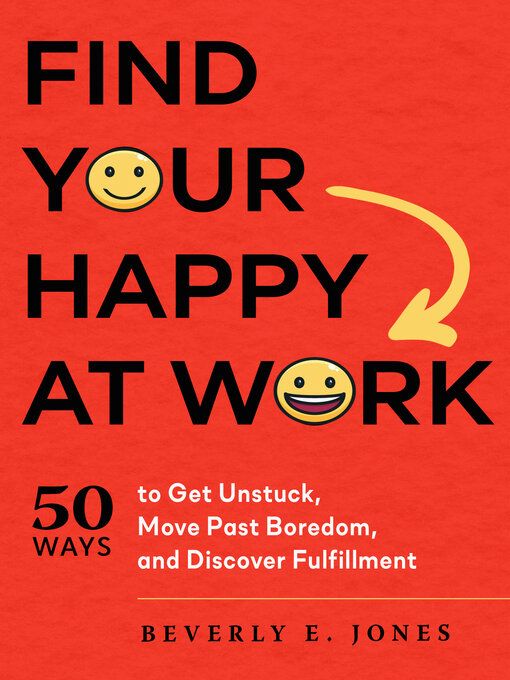Find Your Happy at Work – Beverly E. Jones

Feeling stuck in a rut at work? According to executive coach Beverly Jones, even if you don’t love what you do, you can find meaning and happiness in your career
Your Personal Values
A well-crafted “statement of personal values” can help you pursue the three Ps(Purpose, Positive Relationships, and Performance).
Think of this statement as a guiding idea that shapes how you pursue your work and interact. When crafting your mission statement, consider your values and standards, how you hope to help or serve others, and the activities that give you the greatest sense of satisfaction.
Any busy worker, even those in lively offices, may drift into loneliness without noticing that it’s happening.
Cultivate Relationships
The rise in loneliness poses a problem for people’s health and well-being. Loneliness increases your risk of depression, heart disease and diabetes, among other mental and physical ailments. Relational ties help decrease anxiety and boost confidence and self-esteem. Be aware: You can’t expect to build these healthy connections with others virtually. Replacing conversations with emails and texts can leave you feeling more lonely.
The Engagement Triangle: The Three Ps
Purpose —Work is more enjoyable and engaging when you feel part of something meaningful.
Positive relationships with the people in your job-related sphere – When you feel strong, friendly ties to the people with whom you work, you feel happier and more engaged.
Your performance, or how you approach your work – When your work makes the most of your strengths and provides learning challenges, you experience greater job satisfaction.
Mindfulness And Your Well-Being
Mindfulness, the new name for thousands of years old practice called meditation, counteracts the negative and boosts the positive at work. Mindlessness can lead to missed opportunities, inflexibility, bias, and feelings of helplessness. Mindfulness increases your abilities, creativity, and happiness. Pair mindfulness with a meditation practice to improve your brain functions and lower your stress and blood pressure levels.
Feeling Happy At Your Job
More than half of American workers feel stressed, frustrated, or stuck in their present jobs. This stands in stark contrast to the one-third of workers who feel engaged and are happy, energized and purposeful at work.
You Have The Power To Make Life-Improving Changes
If you identify more with the former than the latter group, know that, even if you don’t see a way out of your current situation, you can make practical changes to improve your work-life balance without changing jobs or careers—specifically, changes to your perspective, skills, approach to life, mental acuity, and health.
The How Of Working
Sometimes, changing how you choose to work gives you a boost. Even if your job doesn’t offer you much autonomy, you can change how you usually do things – even if it’s as small as approaching an assignment with a less pessimistic-than-normal attitude or listening more closely to your colleagues. Your brain reads this simple change as a chance to “be inventive”—a vital component of human happiness.
Form A New Habit
Forming a new habit is a three-step process:
Cue – This is the prompt for the new behaviour you want to turn into a habit.
Routine – This is the action you take in response to the cue—the new habit itself.
Reward – This generates a sense of pleasure about your new habit. Pausing to reflect on how doing the new habit makes you feel can create this sensation.
Get rid of your bad habits by replacing them with good ones
Replace bad habits with better ones by identifying what motivates your unhealthy behaviour. Find better habits that fulfil those needs in healthier ways.
For example, your daily trip to the office cafeteria for a cookie might be less about sugar cravings than a desire to socialize. Identify the cue for the bad habit, and create a new routine connected with that cue.
Start small to make headway on big changes, and celebrate little wins
When it comes to making big changes in your life or career, starting small can help:
“Develop a vision” – Consider your ideal life and career and what big goals might help get you there.
“Identify micro-goals” – Break each big goal into specific, actionable small goals.
“Commit to small progress” – Plan out tiny actions that support each micro-goal.
“Record your progress” – Keep track of your progress.
Self-Care And You
Your well-being influences your happiness and success in the workplace. It is made up of four distinct realms: mind, body, heart and spirit.
The body element includes eating, sleeping, exercising, and stress levels.
Spirit includes your sense of purpose, values, and moral/spiritual beliefs.
The heart includes your relationships, resilience, sense of compassion, love, and joy.
Mind includes mental and brain health, mindfulness, and curiosity.
Your Hobbies And Activities
Make sure your hobby engages you; it should not be something passive, such as binge-watching Netflix.
Along with leisure activities, studies show that spending time in nature is one of the best ways to boost your happiness and health. You can get natural benefits in a variety of ways: Go to a park; put a plant on your desk; get a pet; go for a walk, or seek out a sunny spot to work. Adding color to your workspace, keeping your desk tidy, and choosing a comfortable chair, likewise, support your well-being and productivity.
Having A Growth Mindset
Nurturing a growth mindset – the belief you can develop knowledge and abilities over your lifetime—helps you handle the unexpected and regard setbacks as learning opportunities rather than failures. It helps you develop grit – the ability to keep going in the face of difficulties—by teaching you the value of practising to improve.
Learning bolsters your sense of purpose and autonomy and keeps you from becoming bored.
Happiness and success are similar in that you can’t pursue either directly. Each seems to emerge as a consequence of the way you manage yourself and your activities.

